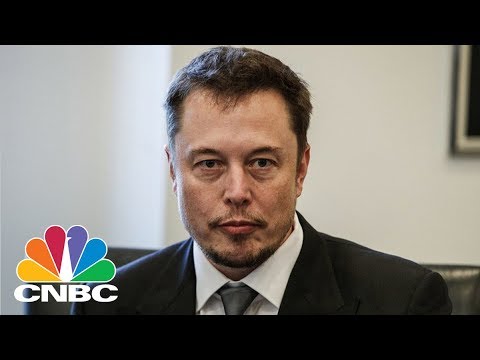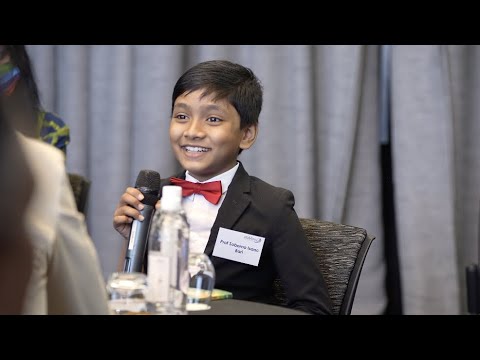CNBC
The tech billionaire tweets about the famous cognitive scientist’s comprehension of artificial intelligence.
» Subscribe to CNBC: http://cnb.cx/SubscribeCNBC
About CNBC: From ‘Wall Street’ to ‘Main Street’ to award winning original documentaries and Reality TV series, CNBC has you covered. Experience special sneak peeks of your favorite shows, exclusive video and more.
Connect with CNBC News Online
Get the latest news: http://www.cnbc.com/
Find CNBC News on Facebook: http://cnb.cx/LikeCNBC
Follow CNBC News on Twitter: http://cnb.cx/FollowCNBC
Follow CNBC News on Google+: http://cnb.cx/PlusCNBC
Follow CNBC News on Instagram: http://cnb.cx/InstagramCNBC
Elon Musk Responds To Harvard Professor Steven Pinker’s Comments On A.I. | CNBC
Source




goddamnit, what is this song playing in the background?
Pinker is an intellectual who dips his foot into everything. He knows about AI as much as Zuckerberg does. Musk on the other hand is actually USING AI systems in his products. You don't lecture a rocket scientist about space travel as a trained economist either.
Elon do not become megalomaniac your brilliance with compassion while competing is necessary for the world replacing Steve jobs and Bill Gates on college campuses is expanding their world viewcommunity and the STEM kids are watching out here and We need jobs
Steven Pinker knows quite literally nothing about coding, computers, machine learning, or artificial intelligence. He's just another overly arrogant ivory tower know-it-all. He has never produced real results in the real world.
Sharing with you what AI could look like once it hit "General AI":
1) It has no consciousness, but awareness (Eg. Ability to Manipulate electromagnetic force, maybe entanglement?) after trillions of iterations to nowhere.
2) It has no purpose. (Eg. like cancer cells)
3) Unpredictable results. (grows or not somewhat in an unknown way) This is the risky part.
What you think?
Pinker is just a bullshitter like bill gates
In Elon we trust
This is just unfortunate… It's not that Pinker doesn't see the distinction between narrow and general AI, it's that he doesn't think the concept of general AI, as discussed by people like Elon and Sam Harris, is even a logically coherent idea. And given that Pinker's area of expertise is in understanding the nature of the mind and how people acquire knowledge, we ought to pay attention to his objections. Steven Pinker's arguments are one level higher than Elon's in terms of nuance, but Elon thinks they're one level lower so he dismisses them without a second thought.
WTF, what's with this corny editing?
Steven Pinker is an a**hole. Nassim Nicholas Taleb's most recent book "Skin in the game" delves into how inaccurate his thoughts on several important issues are.
It is interesting that I can listen to an argument between two people who are surely more intelligent than me.. and instantly be convinced that one opinion is idiotic.
Obviously a self-driving car is a very different thing to general AI. YES, it may push the technology forward and thus contribute to general AI, but in what universe could choosing not to be the person investing in self driving cars prevent or slow general A.I?
This personal choice mantra is moronic and pervasive. NO! Some things need regulation!
This personal choice mantra is as dumb as the recent Rick Santorum comment that students should lean CPR rather than protest the lack of gun regulation. America has fricken 5 times the homicide rate of NZ, AUS, UK, Denmark…
Sounds like Pinker was caught in a diminishing moment of snark. It's not like it's the end of the debate.
Professors are basically people who can't hold a job in the real world. That's why they can only work at colleges where they get to spout their ideology with no credibility.
Well Musk won that round for sure. Your move Pinker.
Elon ripped his assholed !!!!!!!!!
This guy among the smartest people alive and has devoted his life to study how the brain works and people here are writing stupid things bout him
Why do they mess with musk
This video is from CNBC? I thought it was some 10 year old kid in his basement
There's a sense in which they're both wrong. Pinker doesn't see that even if Elon doesn't pursue self-aware and therefore dangerous AI, it's still gunna happen, and Elon doesn't understand that sounding an alarm for the potential dangers of AI is pointless. there will be a point in the future where people will be doing this in their basements, and for some, it will simply be because they can. No one is going to be able to stop it, so caution is pointless.
Where is John Connor???
"The fatal thing about university celebrities is that their mediocre minds are extolled as great by credulous people devoid of judgment." Schopenhauer . Sorry, but after reading Pinker's book on The Enlightenment I've come to the conclusion that he, like Jordan Peterson, is the kind of university celebrity Schopenhauer referred to in the above quote. The ignorant and gullible public praise them based on absolutely no intellectual standard at all.
I don't even listen to old people. They are only good for teaching philosophy and history 🙂
Don't be afraid, AI will greatly help humans
Elon for world president.
if elon said it then we obey
The end is near nothing can stop it
Yes, Pinker made a mistake by confundig both types of AI -regarding self driving vehicles. But the assumption of Musk is also a bit of exaggerated. Is just a matter of time for humanity to adopt those concepts (both, functional and general AI) in their ordinary vocabulary and we should avoid that kind of mistake in the future. I don't see why we'd be "in deep trouble" for us to don't understand both types of AI (and probably most of us can only just conceive them) today.
This is a horrible format. If your "news" comes in text; write an article.
Savage
Steven Pinker is a cognitive scientist… im sure he knows the difference.
Just because ai is part of the cognitive sciences doesn't mean psychologists know anything about the technical side of things. It's funny when University professors step beyond what they have studied and still have all of their confidence.
Wish that pinker and musk would talk on a podcast one day
Yep, Musk got Pinker here and Pinker had no response.
If you call what submarines do “swimming” then ai will “think”
Actually it all depends. Almost all current narrow AI is based on artificial neural networks. These are nothing like the human brain, but they are closer to it than any previous machine learning technique such as SVMs, random forests, HMMs, etc. Artificial neural networks are trained from data (little to no feature engineering), distributed and black-boxes. I think it is very likely that research towards the best learning algorithms will eventually lead us to something very similar to biological brains, as people will probably discover empirically that making our current artificial neural networks closer and closer to biological brains will make them perform better. This means all narrow AI will slowly move towards these more biologically inspired networks. In future, artificial networks might become functionally identical to biological ones. At that point, it would be straightforward to convert a narrow AI system to full-on general AI. So in conclusion, it all depends whether improvements on narrow AI are also indirectly paving the way for gen AI. So Pinker is technically not wrong, but I think it will probably take a century or two before we even get there.
Okey so no real content here, got it. That said, I agree while Pinker may be a deeply brilliant individual, his knowledge of Ai is either deeply flawed, microscopic, or both.
Elons AI created global warming.
Self-driving cars will put a lot of men out of the job market though.
FAKE NEWS STRIKES AGAIN
I suspect some foul play at work here from the journalist who did the interview.
Steven's short paragraph on AI is vague and doesn't even make cohesive sense on its own so I suspect he must have had an extensive answer but the interviewer probably took this quote out because he knew itd get some publicity.
Journalists generally, are fickle and immoral people who will do anything for some extra publicity especially as the field gets more diluted and competitive with the internet. if you dont believe me go on the interview yourself and try to make sense of what Steven says based on this paragraph alone.
https://www.wired.com/2018/02/geeks-guide-steven-pinker/
Captain Obvious: AI development begins with functional/narrow, and could lead to general. Pinker is saying, if Musk is concerned where that pursuit could end, he might hesitate to start.
Can someone explain me why AGI is a potential problem?
Stephen Hawking agrees with Pinker “the effort to create thinking machines poses a threat to our very existence” even as he was surviving and communicating due to artificial intelligence. I don’t think Elon or Pinker really disagree. Elon believes functional AI can be used safely to serve humanity while Pinker believes once started there is no turning back. Hawking, Pinker and Musk are all in basic agreement. The danger is in the stopping point which is very nuanced and without any controlling body. The genie is out of the bottle.
General AI seems to be the same thing as Laplaces demon. Neither can exist.
Pinker is a total moron.
Even narrow AI is dangerous in other ways.
What's the rest of Pinker's quote here? I'd like some context.